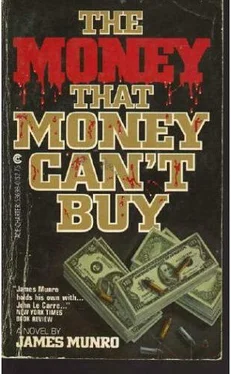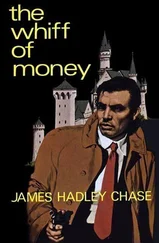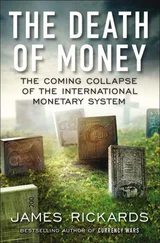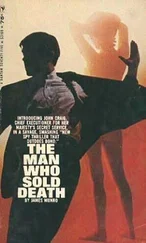James Munro - The Money That Money Can't Buy
1
The three men in the Volkswagen talked mostly about chess, to which they were all devoted. From time to time the conversation veered to ballet and thence to football—one of them had a son who hoped soon to have a trial for his factory team— but mostly they spoke of chess. The landscape did not interest them: lakes, undisciplined woodland, mountains dusted with snow—these were no novelty, and could be ignored; but chess was at once stimulating, familiar, and abstract. It was pleasant to talk of chess when you were on your way to do a job, and pleasant to drive with the windows open after a spell in a deep-sea trawler that had bumped and smashed its way through the North Channel to Whitehaven. The three men were technicians of the highest class: they were used to better transport and accommodation, but grumbling didn't occur to them. Not one wholly trusted the other two, except in the performance of their essential and highly specialized duties.
The driver braked for a "halt. major road ahead"sign. Like the others, he had never been to England before, but the KGB had taken care of
driving on the left for him, as it had taken care of everything else. He knew all about motorways and coffee bars, and which newspaper matched which clothes, and when to order beer and when to stick to Scotch. He and the others had had their hair cut for three months by a barber who had worked in Croydon. The clothes they were wearing had been bought a piece at a time from sports shops in London, Switzerland, Inverness: windcheaters, heavy nailed boots, windproof trousers, knitted hats. Their climbing rope was supple and well-used, their ice ax old and carefully maintained. Their very suntans had been applied with care, layer after layer of sun and wind against pale skin, so that they looked as if the mountains had called them from childhood. Their eyes, it is true, were wary, and blinked little, but climbers also are cautious men.
They turned left at a sign that said "keswick—7 miles," drove on through the gaunt, pure beauty of the Lake District, and ignored it utterly. At their first glimpse of Derwentwater, their talk was still of knights and bishops, W formations, and Spectre de la Rose. Only when they reached the little town they grew silent, until the man beside the driver called out directions from the map he had spent a week in memorizing, and the Volkswagen nosed its way past hotels and sports shops and shops that sold Lakeland jet, woollens and rum butter and postcards and watercolors, into a twisted skein of side streets that the navigator knew as well as the face of his son who might soon play for the factory team, though he had never seen them before. They reached their destination at last, and the driver of a
Volkswagen van which had sprawled across two parking places pulled up and gave them room to park. There was perhaps a certain delicacy in the choice of German transport for such an internationally flavored operation.
The driver and co-driver got out, and the man in the back seat followed them. They stood together, stretched, and lit cigarettes, English cigarettes, king-size tipped. The lighter the driver used was English. He'd been told he could keep it, but they hadn't given him any fuel, and butane was difficult to obtain at home. The driver nodded at a restaurant across the street. The co-driver nodded agreement, but the third man shook his head and moved into the driver's seat. The other two men crossed the street toward the restaurant. It was April in the week before Easter, a cold day, with the threat of snow, and the street was very quiet. The third man pulled the gloves tight over his hands, and felt down the space between the two front seats. The ice ax was there. He pulled the latch of the car door open, laid the ice ax on his lap, and watched the big picture window of the restaurant.
It was a new restaurant, with a decor of plastic designed to look like undressed pinewood. It sold eggs, bacon, hamburgers, sausages, baked beans, and chips in quantities designed to cope with the limitless appetites of walkers and climbers. When the driver and co-driver entered the restaurant and sat at the table nearest the door, it held a party of young men and girls in one corner who had already walked eleven miles that day and were waiting in impatience for their waiter. They could hear him talking in slow, patient English to a woman cook whose Lakeland accent was difficult for him to understand, hear also the sputter of frying fat and the clatter of crockery. They gobbled bread and wondered aloud if they had ordered enough, laughing to hide their embarrassment that they should crave so desperately anything as mundane as food. The two men by the door smoked king-sized tipped cigarettes and waited.
The waiter was Chinese. He was young, tall, long-muscled, and deft at his job. He carried a tray piled with food, and he moved surely and neatly. As he skirted a table, he faced, for perhaps two seconds, the driver and co-driver. The driver spoke one phrase in Cantonese dialect. It had taken him three days to learn to say that phrase exactly right: Cantonese is difficult for any European. The group in the corner didn't hear what he said. Their embarrassment of laughter increased when they saw the object of their desire: rich gold of chips, pale gold of eggs, ham blush-pink, and the bold brown of sausage. But they did notice that the waiter stiffened, and the long, elegant lines of his body hardened with close-packed muscle, that his face showed first astonishment, then despair.
And then the waiter moved. He threw the trayful of food, their beautiful, yearned-for food, at the two men by the door, and next did something even more crazy. He crossed his arms over his face and dived through the window. Glass flew like throwing knives at the group in the corner. One of the girls screamed, and the co-driver shouted "What's going on?" then rushed for the door with the driver. They ran out into the street, the Volkswagen van backed up and they jumped inside. Half a minute went by before one of the hungry ones went out. There was no living thing there: only a youngish Chinese waiter in white mess jacket and black trousers, an ice ax in the back of his head. The hungry one discovered that empty as his stomach was he could still be sick.
* * *
Craig disliked going to Queen Anne's Gate. It meant conferences and paperwork, most of it futile, and rows with a fat, angry man who could never find enough men for the things he had to do. He walked up to the front door and looked at the row of brass plates: Dr. H. B. Cunnington-Low, Lady Brett, Major Fuller, The Right Reverend Hugh Bean. The sort of people you expected to find in Queen Anne's Gate—except that they didn't exist. He pressed the bell marked "Caretaker," and the door opened at once. The man who opened it was short, muscular, and fast-moving, an excommando sergeant who was there because he had killed neatly, precisely and without emotion. Beneath the overalls he carried a Smith and Wesson revolver and a commando knife. From time to time, Craig practiced unarmed combat with him. The caretaker dreaded these sessions.
"Morning, guv," said the caretaker. "His nibs is in."
"How is he?" asked Craig.
"Funny," said the caretaker. "Half the time he's mad, other half he's—well, he acts like something's happened and he can't believe it. Then he gets mad again."
Craig took a tentative step backward. "There's a chap I promised to see," he said.
"I'm to log you in," said the caretaker, "and you've to stand by."
Craig sighed and went up the stairs to his office. The caretaker scowled. He hated to bring bad news to Craig. Their practice sessions on the dojo mat were bad enough without that.
Читать дальше












